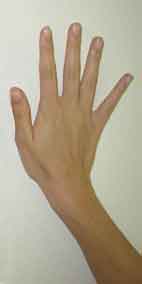|
 |
||
 |
Hints and strategies |
||
| HINT 1
Make a list of the first primes. Thinking about the game, at what stage in the list do you think there is going to be a problem? |
| HINT 2
Starting from the prime number you found in Hint 1, work backwards to find the best starting number. |
|
SOLUTION
The first primes are 2, 3, 5, 7, 11, 13, 17, 19, 23, 29, ... . Since the gap between 23 and 29 is six, clearly the winner is the one obtaining the total 23. Hence you want your opponent to reach 19. This will happen if you reach 17, your opponent reaches 13, you reach 11, your opponent reaches 7, you start with 5. |
| EXTENSIONS
1. We have seen that first player wins if the starting number is 5. Are there other possibilities? 2. Explore how the game would go if you could use both hands. 3. We could vary the rules, for example by using Fibonacci numbers in place of primes. |